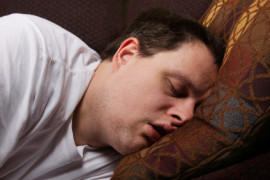The link between obesity and obstructive sleep apnea may be in our mouths, according to a 2014 study in Sleep.
In the study, which examined 121 obese individuals with and without OSA, found that those people with sleep apnea had greater amounts of tongue fat than those without OSA. Interestingly, the majority of the tongue fat deposits were in the base of the tongue, which could, of course, contribute to obstruction of the airway when relaxed.
Obstructive sleep apnea is a condition in which the airway becomes obstructed during sleep, stopping breathing for periods of time during the night. According to the National Heart, Lung, and Blood Institute, more than 12 million people in the United States alone suffer from obstructive sleep apnea, which is often (though not always) accompanied by snoring as the individual tries to breathe through the obstruction.
Sleep apnea and other sleep disorders lead to a long list of life-impairing and life-threatening side effects, including
- High blood pressure
- Cardiovascular disease
- Weight gain and obesity
- Diabetes
- Motor vehicle crashes
- Depression
- Poor job performance
- Memory problems
- Job impairment
- Erectile dysfunction
- Headaches
Obstructive sleep apnea is primarily treated with continuous positive airway pressure (CPAP), in which air is forced through the airway, or oral appliance therapy, which adjusts the anatomy of the mouth and throat in order to open the airway.
While it’s still unclear why tongue fat would vary in individuals with similar levels of obesity, the study results do suggest that an excess of tongue fat may contribute to obstructive sleep apnea.
There is no healthcare professional that is more familiar with their patients’ mouths and tongues than the dental team. It follows, therefore, that the dental office would be an ideal place to screen for and treat obstructive sleep apnea, perhaps especially when it comes to excess tongue anatomy.
Source: Tongue Fat and its Relationship to Obstructive Sleep Apnea



